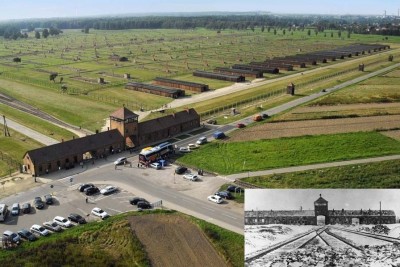Antisemitic Vandalism at Auschwitz-Birkenau Highlights Alarming Trend
One day after an Austrian delegation, including President Van der Bellen, Foreign Minister Schallenberg, and EU Minister Edtstadler spoke at the opening of the new Austrian exhibition at the Auschwitz-Birkenau Museum and Memorial, the museum reported antisemitic vandalism at the camp. The shocking incident underscores a larger trend of antisemitism in Europe and around the world. Read more about the incident, the trend of antisemitism, and what is being done to combat it.
 EU Minister Karoline Edtstadler: "The Europe-wide fight against anti-Semitism must not remain lip service." / Picture: © Wikimedia Commons / Air-Quad UG, CC BY-SA 3.0 DE (https://creativecommons.org/licenses/by-sa/3.0/de/deed.en)
EU Minister Karoline Edtstadler: "The Europe-wide fight against anti-Semitism must not remain lip service." / Picture: © Wikimedia Commons / Air-Quad UG, CC BY-SA 3.0 DE (https://creativecommons.org/licenses/by-sa/3.0/de/deed.en)
Just one day after an Austrian delegation visited Auschwitz-Birkenau–the former Nazi extermination camp where over 1.1 million men, women, and children lost their lives–the memorial and museum released a statement confirming that nine barracks at the memorial had been vandalized with antisemitic references.
In their statement, the museum called the incident “an outrageous attack on the symbol of one of the greatest tragedies in human history and an extremely painful blow to the memory of all the victims of the German Nazi Auschwitz-Birkenau camp.”
Statement concerning the vandalism that took place on October 5 at the Auschwitz II-Birkenau site. pic.twitter.com/bsNepIRCcL
— Auschwitz Memorial (@AuschwitzMuseum) October 5, 2021
This egregious act of antisemitism came on the heels of the museum opening the new Austrian exhibition “Distance – Austria and Auschwitz,” which more accurately depicts Austria’s role in the horrors of the Shoah.
Confronting history
On the day before the incident, Austrian President Alexander Van der Bellen, Foreign Minister Alexander Schallenberg, EU Minister Karoline Edtstadler, and others gave remarks at Auschwitz about confronting history and combating antisemitism.
Foreign Minister Schallenberg emphasized, “This is a place of the unspeakable – and that’s why we need to raise our voices here: for six long years, people were dehumanized and murdered in this extermination camp. People from all over Europe, including countless Jews, fell victim here to a despicable regime and its aides. This unfathomable suffering is almost impossible for us to grasp in terms of its enormity and bestiality.”
He continued, “Today’s opening of the Austrian exhibit faces this dark part of our history head-on. We must confront the shadows of the past – as a state, as politicians, and as individuals. That is the only way for us to turn ‘never forget’ into ‘never again’.”
President Van der Bellen’s speech echoed Schallenberg’s sentiments about confronting Austria’s history, and he concluded by saying, “‘Never again’ means that we resolutely oppose any attempt to destroy the rule of law and liberal democracy and defend fundamental rights and freedoms. ‘Never again’ means opposing attempts at nationalist self-aggrandizement and standing up for equal coexistence. But ‘never again’ means above all: no tolerance for racism and no tolerance for antisemitism.”
Antisemitism on the rise
The antisemitic vandalization of the site of one of the worst atrocities in human history underscores an alarming trend of antisemitism that can be seen in Austria, Europe, and throughout the world.
Vindobona previously reported that antisemitic incidents in Austria doubled in the first half of 2021.
EU Minister Edtstadler acknowledged this trend in her speech at Auschwitz, “The roots of hatred are still present in the middle and depth of society. More than 70 years after the end of the Shoah, antisemitism is on the rise across Europe and worldwide.”
Edtstadler said that “society as a whole is called upon to fight hatred.”
Combating antisemitism
While discussing the EU’s strategy for combating antisemitism, Edtstadler again noted the alarming trend and said she was pleased that many Austrian proposals had been adopted.
The European Commission’s strategy is based on the pillars of preventing and combating antisemitism, protecting and promoting Jewish life in the EU, as well as Holocaust remembrance and educational measures.
Edtstadler said, “In particular on the Internet, there is a major problem with the illegal sale and display of Nazi-related symbols or relics. At Austria's request, the Commission will in future work with industrial and IT companies to combat these activities more effectively.”
She also highlighted Austria’s proposals for education and research, such as the establishment of a European research center for contemporary antisemitism and the funding of an EU-wide survey on antisemitic prejudices among the population, as well as increased involvement of civil society through an annual forum to combat antisemitism.
The statements from Schallenberg, Van der Bellen, Edtstadler, and other leaders are important, and the strategy provided by the European Commission is even more so.
However, given the startling upward trend in antisemitic incidents around the world, it is even more important that these words and strategies are actually implemented. “The Europe-wide fight against anti-Semitism must not remain lip service,” declared Ms. Edtstadler.



